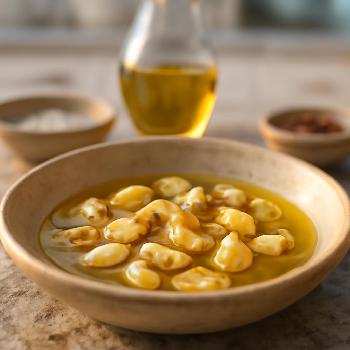Soups & Stews > Soup Making Techniques > Sautéing Aromatics > Sautéing Garlic Without Burning
Mastering Garlic Sautéing for Soups and Stews
Learn the art of sautéing garlic to perfection, ensuring a rich, aromatic flavor in your soups and stews without any bitterness from burning. This guide provides detailed steps and essential tips to help you achieve culinary excellence.

Ingredients
- 4-6 Garlic Cloves
- 2 tablespoons Olive Oil
- 1 tablespoon Unsalted Butter (optional)
- 1/8 teaspoon Pinch of Salt
- 1/4 teaspoon Red Pepper Flakes (optional)
Preparation is Key
Finely mince or press the garlic cloves. Evenly sized pieces prevent uneven cooking. Have all ingredients measured and ready to go before you start. This allows you to focus on the cooking process and prevents burning.
Choosing the Right Fat
Use a good quality olive oil with a high smoke point. Olive oil provides flavor and helps distribute heat evenly. A small amount of butter can be added for extra richness, but be mindful as butter burns more easily than olive oil.
Low and Slow is the Way to Go
Heat the olive oil in a pan over low to medium-low heat. The key to preventing burning is gentle heat. Add the minced garlic to the pan. Stir constantly to ensure even cooking and prevent sticking.
Watch for Color
Sauté the garlic until it turns a light golden color and becomes fragrant, usually about 2-3 minutes. Avoid letting it turn brown or dark, as this indicates burning and will result in a bitter taste. If adding red pepper flakes, add them at the same time as the garlic for infused flavor.
Stop the Cooking Process
Once the garlic reaches the desired color, immediately remove the pan from the heat to prevent further cooking. If adding the garlic to a soup or stew, do so immediately. If not, transfer the garlic to a cool dish to stop the cooking process.
Seasoning
Add a pinch of salt to the garlic while sautéing. This helps to draw out moisture and enhances the flavor. Be mindful of the salt content in the rest of your recipe.
Nutrition Facts Estimated per 100g of product
Note: Nutritional information is an estimate and will vary based on specific ingredients and amounts used.
Other Considerations for Nutrition
Adding butter increases fat content. Adjust salt and red pepper flakes to your dietary needs.
FAQ
-
Why does my garlic always burn?
Garlic burns easily due to its high sugar content. Using low heat and constant stirring is crucial to prevent burning. Make sure your pan isn't too hot to begin with. -
Can I use pre-minced garlic?
While convenient, pre-minced garlic tends to burn more easily due to its smaller particle size and often contains preservatives. Freshly minced garlic is always recommended for the best flavor and control. -
What if I accidentally burn the garlic?
Unfortunately, there's no recovering burnt garlic. Discard it and start with fresh garlic. Burnt garlic will impart a bitter taste to your entire dish. -
Can I use a different type of oil?
Yes, you can use other oils with a high smoke point like avocado oil or grapeseed oil. However, olive oil contributes a distinct flavor that complements many soups and stews.
